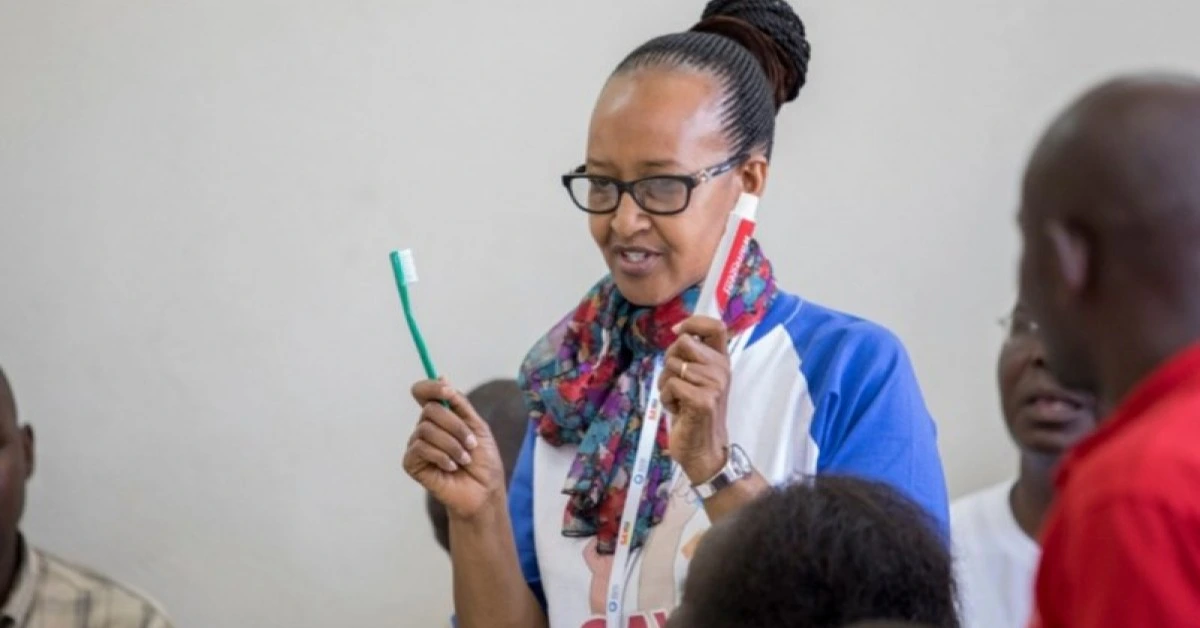
RWANDA – The Rwanda Biomedical Centre (RBC) has called on Rwandans to adopt better oral hygiene habits and seek regular dental check-ups to prevent severe health complications.
Speaking during World Oral Health Day celebrations in Kigali on March 20, Irene Bagahirwa, Director of the Injuries and Disabilities Unit at RBC, highlighted the widespread issue of poor oral hygiene and its long-term impact on overall health.
“A 2022 study found that 57 percent of Rwandans aged 18 and above do not brush their teeth regularly,” Bagahirwa said.
“Ideally, people should brush after every meal, but given daily life constraints, brushing at least in the morning and at night is crucial. The issue is not only a lack of brushing but also improper brushing techniques.”
Low dental care utilization and rising oral diseases
Bagahirwa further noted that only 33 percent of Rwandans seek dental care when needed, with most visiting a dentist only when their condition has worsened, often leaving extraction as the only option when early treatment could have saved the tooth.
“Gum disease and tooth decay are the most common oral health problems, alongside oral cancers,” she explained.
“While these conditions may not always be fatal, they significantly affect daily life. In 2024, oral diseases ranked among the top 20 conditions requiring hospital visits.”
Poor oral health also affects self-confidence and mental well-being, with some individuals feeling embarrassed to smile or speak due to bad breath. “No one should have to cover their mouth before smiling,” Bagahirwa added.
Oral health and systemic diseases
Dr. Achille Bizimana, head of Rwanda’s Dental Surgeons Organization, emphasized the link between oral health and systemic diseases. “Research has shown that many serious diseases can originate from poor oral hygiene,” he said.
For instance, dental cavities can contribute to heart disease. “The bacteria responsible for cavities can enter the bloodstream and infect the heart’s lining, leading to a condition known as infective endocarditis, which can cause severe heart complications,” Dr. Bizimana explained.
He also highlighted the connection between oral health and diabetes. “Oral diseases can worsen diabetes, just as diabetes can negatively impact oral health,” he noted.
Additionally, periodontitis—a severe gum infection—has been linked to premature births and stillbirths in pregnant women.
The need for preventative measures
Dr. Bizimana stressed that most oral diseases are preventable through simple daily practices. “Brushing twice a day—in the morning and before bed—is essential. People should also limit their intake of sugary foods and visit a dentist at least twice a year,” he advised.
When patients seek dental care late, treatment becomes more difficult and recovery takes longer. “Regular medical check-ups can help detect oral diseases early and prevent serious complications,” Dr. Bizimana noted.
He also raised concerns about oral cancers in Rwanda, often linked to smoking. “Nicotine is a major cause of oral cancers, and we need to raise awareness about its dangers,” he warned.
Oral health and children’s well-being
Dr. Bizimana pointed out the importance of caring for children’s teeth from an early age. “If baby teeth are not properly maintained, they may fall out too soon, leading to misalignment in permanent teeth. This can affect a child’s ability to eat, speak, and even impact their self-esteem and school performance.”
He also emphasized the need for proper brushing techniques and toothbrush maintenance. “Oral hygiene is not just about putting a toothbrush in your mouth. It requires proper technique and timing.
“Toothbrushes should be replaced every three months, yet some people use them for years. Improper storage can also cause bacterial growth, making the toothbrush a health hazard instead of a hygiene tool.”
The RBC continues to advocate for improved oral health care services across Rwanda. Dental care is available at various levels, including health centers and district hospitals, with referrals to advanced facilities for specialized treatment when needed.
“Prevention is always better than cure,” Dr. Bizimana concluded, urging all Rwandans to prioritize their oral health to avoid preventable diseases and improve their overall well-being.
XRP HEALTHCARE L.L.C | License Number: 2312867.01 | Dubai | © Copyright 2025 | All Rights Reserved